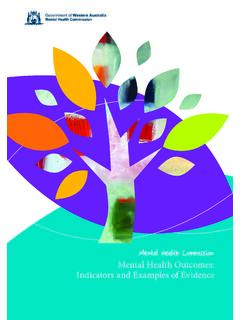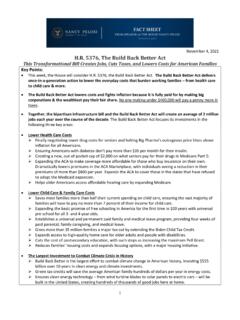Transcription of The adverse effects of social isolation and loneliness on ...
1 The adverse effects of social isolation and loneliness on psychological and physical health outcomes in care home residents during Covid-19 social isolation (the absence or near absence of social connections or relationships) and loneliness (the extent to which someone feels socially isolated or unhappy about their social relationships) are conceptually distinct, but related constructs1. There is evidence for a consistent association between these constructs and adverse health outcomes, particularly in relation to cardiovascular health2 4, mortality 1,5, and mental health6 7. Determining causality is problematic as much of the research in this area involves observational studies8. This briefing considers the evidence for the adverse health effects of social isolation and loneliness in the general population and care home settings. In light of the current COVID-19 crisis and imposed physical distancing measures, we also consider interventions to mitigate the risk of adverse health events due to social isolation and loneliness in care home settings.
2 We conducted an initial search of literature in Google Scholar and this was followed by a more formal search for evidence from systematic reviews in MEDLINE (Ovid) (Appendix A). We would emphasise the rapid nature of the review conducted and the caveats this implies. Evidence for an association between social isolation / loneliness and adverse health events There is strong evidence in the form of systematic reviews for an association between social isolation and loneliness and ill- health in the general population. A 2017 overview of 40 systematic reviews8 (mainly of observational studies) identified evidence from two meta-analyses for a significant association between social isolation and loneliness and increased all-cause mortality. Odds ratios (ORs) show an increased likelihood of mortality for social isolation of (95%Confidence Interval (CI); , ), and an increased likelihood of mortality for loneliness of (95% CI; , ).
3 Good social connections are protective with hazard ratios (HR) for all-cause mortality for greater social participation of HR= (95% CI , ) and for better social networks of HR= (95% CI , ). A 2018 meta-analysis supports the findings in relation to loneliness and mortality, with loneliness identified as a risk factor in all-cause mortality (pooled HR= ; 95% CI , )9. Less robust evidence from narrative systematic reviews suggest associations with poorer mental health outcomes8. Recent evidence from national surveys in Switzerland6 and Singapore7 suggest loneliness is related to depression in adults of all ages. Furthermore, recent evidence from a systematic review and meta-analysis found that loneliness was positively associated with an increased risk of dementia (RR= ; 95% CI= , ), although the association with mild cognitive impairment remains unclear10. These findings are particularly concerning in the context of care homes as a recent meta-analysis on the prevalence of loneliness in people living in residential and care home settings estimated mean prevalence of moderate loneliness at 61%, and mean prevalence of severe loneliness at 35%11.
4 Specific evidence on adverse health outcomes and mortality in relation to social isolation and loneliness in care homes is lacking. A systematic review of 18 studies found prevalence rates of loneliness , anxiety and depression were generally high in long-term care settings12, however the specific association between loneliness and mental health outcomes was not addressed. social isolation and loneliness may have been a problem for many community-dwelling older adults and care home residents prior to the COVID-19 pandemic, but this has likely been exacerbated due to social distancing measures and the cessation of care home visits13,14. Although there is currently no direct evidence for the negative impact COVID-19 social distancing measures may have on the health of care home residents, these measures are likely to have led to an increased sense of isolation and loneliness15,16, which as indicated above are established risk factors in mortality, cardiovascular disease, depression, and dementia in the general population.
5 Interventions to mitigate risk of adverse health events due to social isolation and loneliness in care homes In the context of the COVID-19 pandemic, many experts in the field of ageing have highlighted the risk of isolation and loneliness and have emphasised the importance of providing interventions to increase social connectivity in care homes, as well as the general population. As family are not permitted to visit care homes, this is likely to increase the isolation of residents. In addition, many care homes have cancelled group activities and communal dining which may further exacerbate isolation and feelings of loneliness17. Digital solutions, such as tablet devices, could be used to support social connections, as they can be used by staff as well as family members to support and communicate with residents via video calls15,18. However, technology may not be suitable for all residents, particularly those with dementia13.
6 social workers can also play a role in providing regular updates on residents to family members who may be concerned about their well-being18. Regular and meaningful telephone conversations to ensure the needs of older people are being met could be provided by family members, friends, local charities or voluntary organisations, while mail deliveries in the form of parcels, cards, and letters could help ensure older people feel connected to the outside world19. There is currently no evidence for the effectiveness of these interventions in care homes in the context of COVID-19. However, a recent study highlighted the positive effects of a social networking intervention in reducing social isolation and mortality rates in Italian community-based older adults during COVID-1920, suggesting social connections can be facilitated in the context of such a pandemic. The NIHR Older People and Frailty Policy Research Unit recently reviewed effectiveness of remote delivery of befriending, social support and low intensity psychosocial interventions, in reducing social isolation and loneliness among older adults and identified components of successful interventions which could be implemented21.
7 Dr Lisa McGarrigle NIHR Research Fellow, School of health Sciences, The University of Manchester Prof Chris Todd Professor of Primary Care and Community health , School of health Sciences, The University of Manchester, and Director NIHR Older People and Frailty Policy Research Unit. This briefing presents independent research funded by the National Institute for health Research through a NIHR Senior Investigator Award to Prof Todd, NIHR Policy Research Unit in Older People and Frailty, and NIHR Applied Research Collaboration Greater Manchester. The views expressed are those of the authors and not necessarily those of the NHS, the NIHR, the Department of health and social Care, or its partners. References 1. Holt-Lunstad J, Smith TB, Baker M, Harris T, Stephenson D. loneliness and social isolation as risk factors for mortality: a meta-analytic review. Perspect Psychol Sci J Assoc Psychol Sci. 2015;10(2):227-237.
8 2. Valtorta NK, Kanaan M, Gilbody S, Hanratty B. loneliness , social isolation and risk of cardiovascular disease in the English Longitudinal Study of Ageing. Eur J Prev Cardiol. 2018;25(13):1387-1396. 3. Valtorta NK, Kanaan M, Gilbody S, Ronzi S, Hanratty B. loneliness and social isolation as risk factors for coronary heart disease and stroke: systematic review and meta-analysis of longitudinal observational studies. Heart. 2016;102(13):1009-1016. 4. Hakulinen C, Pulkki-R back L, Virtanen M, Jokela M, Kivim ki M, Elovainio M. social isolation and loneliness as risk factors for myocardial infarction, stroke and mortality: UK Biobank cohort study of 479 054 men and women. Heart Br Card Soc. 2018;104(18):1536-1542. 5. Steptoe A, Shankar A, Demakakos P, Wardle J. social isolation , loneliness , and all-cause mortality in older men and women. Proc Natl Acad Sci. 2013;110(15):5797-5801. 6. Richard A, Rohrmann S, Vandeleur CL, Schmid M, Barth J, Eichholzer M.
9 loneliness is adversely associated with physical and mental health and lifestyle factors: Results from a Swiss national survey. PLOS ONE. 2017;12(7):e0181442. 7. Ge L, Yap CW, Ong R, Heng BH. social isolation , loneliness and their relationships with depressive symptoms: A population-based study. PLOS ONE. 2017;12(8):e0182145. 8. Leigh-Hunt N, Bagguley D, Bash K, et al. An overview of systematic reviews on the public health consequences of social isolation and loneliness . Public health . 2017;152:157-171. 9. Rico-Uribe LA, Caballero FF, Mart n-Mar a N, Cabello M, Ayuso-Mateos JL, Miret M. Association of loneliness with all-cause mortality: A meta-analysis. PloS One. 2018;13(1):e0190033. 10. Lara E, Mart n-Mar a N, De la Torre-Luque A, et al. Does loneliness contribute to mild cognitive impairment and dementia? A systematic review and meta-analysis of longitudinal studies. Ageing Res Rev. 2019;52:7-16. 11.
10 Gardiner C, Laud P, Heaton T, Gott M. What is the prevalence of loneliness amongst older people living in residential and nursing care homes? A systematic review and meta-analysis. Age Ageing. Published online 2020. 12. Elias SMS. Prevalence of loneliness , anxiety, and depression among older people living in long-term care: a review. Int J Care Sch. 2018;1(1):39 43. 13. National health Library & Knowledge Service A, Madden A, Leen B. Evidence Summary: What Is the Impact of the Coronavirus Pandemic on the Mental health of Elderly Nursing Home Residents? [ ]. health Service Executive; 2020. Accessed June 24, 2020. 14. Lithander FE, Neumann S, Tenison E, et al. COVID-19 in older people: a rapid clinical review. Age Ageing. 15. Flint AJ, Bingham KS, Iaboni A. Effect of COVID-19 on the mental health care of older people in Canada. Int Psychogeriatr. Published online undefined/ed:1-4. 16. Gardner W, States D, Bagley N.














